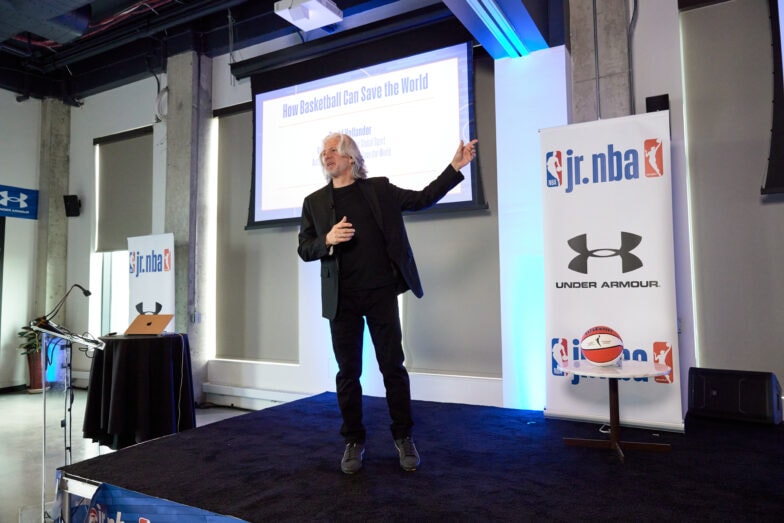
David Hollander founded World Basketball Day, which is celebrated annually on Dec. 21.
Few can claim to have sparked a global movement like David Hollander. As a professor at New York University’s Tisch Institute Of Global Sport, the founder of World Basketball Day and author of How Basketball Can Save the World, he sees basketball as a universal language—one that transcends cultural boundaries and brings peace.
In August 2023, the United Nations officially recognized December 21 as World Basketball Day—the day Dr. James Naismith first introduced the game at the Springfield YMCA in 1891. The historic solution co-sponsored by 76 countries, made basketball the first team sport to be honored with an official U.N. International Day.
Hollander spoke with NBA.com about the creation of World Basketball Day and basketball’s impact around the globe.
Editor’s note: The following interview has been edited and condensed for clarity.
NBA.com: You’ve been instrumental in founding World Basketball Day. Can you tell us the story behind its inception and what it means to you on a personal level?
Hollander: In my book published in February 2023, I stated, we need to start somewhere, something that the whole world is okay with. I use my book to make the argument that basketball is that thing, nothing has the games ubiquity and influence across all cultural verticals. So in my book I drafted a United Nations resolution for World Basketball Day, then I had my class flood the inbox of the UN ambassador pushing for its inception. This led to a June 2023 meeting with Philippines diplomats from the United Nations, and in August 2023, with the hard work from both sides of the table, the World Basketball Day resolution was adopted by consensus, the fastest UN resolution from conception to adoption in UN history.
Basketball can be a platform where nations can come together. I actually want people to play the game, which will create the feeling, create the bonding and understanding between other humans in that special space of basketball. If enough people do that one thing, on that one day, in 50 years it will be a day where peace is felt everywhere.
NBA.com: When did it first hit you that basketball is a global sport? Is there a particular moment or experience that stands out for you?
Hollander: It’s funny because I never thought of it any other way. Wherever I’ve traveled, and I’ve been to a lot of places on Earth, basketball courts are a consistent visual. It’s a common space that everyone can participate in. I love where the NBA is now in terms of global growth, and I don’t think there’s been a sport that has been more intentional in becoming global. In the late 1890’s, James Naismith would send boats to France, Brazil, Australia and China looking to spread this beautiful game. It’s amazing.
NBA.com: What can other regions, particularly those outside of traditional basketball powerhouses like the U.S./Europe, teach us about how the game can evolve?
Hollander: I titled my book “How Basketball Can Save The World” not “How Basketball Can Save Basketball.” Basketball’s ok. It always has been. Nikola Jokic famously said, “I don’t jump high, I don’t run fast, I just play basketball.” Which should make one ask, “what does it mean to play basketball?” It means that this is a sport that recognizes the widest possible range of human talents. This is a sport that can’t solely be measured by individual greatness because it’s intrinsically a team game. It’s a sport where you watch a guy like Jokic, there’s the possibility for new categories that we haven’t even measured of how to be great in this game. So although there are different styles and systems from a development perspective, the answer lies within the ambiguity of the game.
NBA.com: What is your vision for the future of basketball, and what role do you hope World Basketball Day will continue to play in shaping that future?
Hollander: I hope people say World Basketball Day was the initial platform where the world began to recognize and reposition basketball as a value system, and social and developmental institution, on the same level as other global value systems, such as art, literature, science. I happen to think basketball has that kind of power, and I hope World Basketball Day is just the first statement of how much more basketball can be.
NBA.com: If you could look 20 years into the future, where do you see basketball? What changes do you hope to see in the sport, both in terms of its global influence and its cultural significance?
Hollander: I hope people see the game as a shorthand for peace and community. A shorthand for in person cooperation and inclusivity. A gender agnostic way of being connected. Almost like a periodic table of principles that you can apply and combine to solve the world’s most pressing problems. That’s what I hope.
This post was originally published on this site be sure to check out more of their content.



